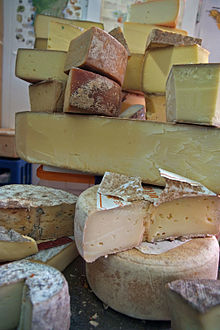queso
English
Etymology
Borrowed from Spanish queso, as found in Tex-Mex cuisine.
Pronunciation
- Lua error in Module:parameters at line 95: Parameter 1 should be a valid language or etymology language code; the value "GenAm" is not valid. See WT:LOL and WT:LOL/E. IPA(key): /ˈkeɪsoʊ/
- Lua error in Module:parameters at line 95: Parameter 1 should be a valid language or etymology language code; the value "RP" is not valid. See WT:LOL and WT:LOL/E. IPA(key): /ˈkeɪsəʊ/
- Rhymes: -eɪsəʊ
Noun
queso (uncountable)
Derived terms
Old Spanish
Etymology
From Latin cāseum, accusative of cāseus. Cognate with Old Leonese keso and Old Portuguese queijo.
Pronunciation
Noun
queso m (plural quesos)
- cheese
- c. 1250: Alfonso X, Lapidario, f. 12v.
- Et ſi la fregan con la leche. lo q́ ende ſale, quaia toda la leche ſobre q́ la pongan ¬ por ende los daq́lla tierra uſan della en ſus q́sos. ¬ en toda otra coſa de leche q́ quieré quaiar.
- And if they wash it with milk, what results from it curdles the milk into which it is put, and so the people of that land use it in their cheeses, or in any other dairy thing they wish to curdle.
- Et ſi la fregan con la leche. lo q́ ende ſale, quaia toda la leche ſobre q́ la pongan ¬ por ende los daq́lla tierra uſan della en ſus q́sos. ¬ en toda otra coſa de leche q́ quieré quaiar.
- c. 1250: Alfonso X, Lapidario, f. 12v.
Descendants
Spanish

Etymology
From Old Spanish queso, from Latin cāseus, ultimately from Proto-Indo-European *kwat- (“to ferment”).
Pronunciation
Noun
queso m (plural quesos)
- cheese
- Synonym: formaje
- (Spain, colloquial) foot
Derived terms
(diminutive quesillo or quesito or quesín)
Related terms
Descendants
Further reading
Categories:
- English terms borrowed from Spanish
- English terms derived from Spanish
- English 2-syllable words
- English terms with IPA pronunciation
- Rhymes:English/eɪsəʊ
- English lemmas
- English nouns
- English uncountable nouns
- en:Cheeses
- Old Spanish terms inherited from Latin
- Old Spanish terms derived from Latin
- Old Spanish terms with IPA pronunciation
- Old Spanish lemmas
- Old Spanish nouns
- Old Spanish masculine nouns
- Spanish terms inherited from Old Spanish
- Spanish terms derived from Old Spanish
- Spanish terms inherited from Latin
- Spanish terms derived from Latin
- Spanish terms derived from Proto-Indo-European
- Spanish 2-syllable words
- Spanish terms with IPA pronunciation
- Spanish lemmas
- Spanish nouns
- Spanish countable nouns
- Spanish masculine nouns
- Peninsular Spanish
- Spanish colloquialisms
- Spanish basic words
- es:Cheeses